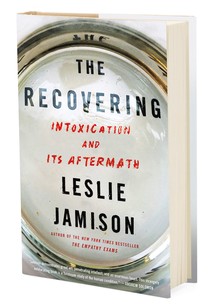In
The Recovering: Intoxication and Its
Aftermath, Leslie Jamison's immersion into the consuming murk of
addiction and the sparkling sea of its literature—the novels of Jean
Rhys, with their abject heroines haunted by lost children and lovers; the short
fiction of Raymond Carver ("painful and precise, like carefully bitten
fingernails")—the author asks "if stories about getting
better could ever be as compelling as stories about falling apart."
It's no mean feat, morphing the alcoholic's plodding modus
operandi ("
More. Again. Forever." as Jamison puts
it) into sentences that surprise and shimmer, but she achieves it here
frequently: "Booze helped you see, and then it helped you survive the
sight," she writes of her youthful devotion to this sodden mythology. "I
idolized the iconic drunk writers because I understood their drinking as proof
of extreme interior weather."
But even hurricanes get dull if you suffer through enough of
them. About halfway into the book, Jameson admits, "I'd gotten sick of how
melodramatic I was when I was drunk"—by which point the reader
may share that sentiment—"but now sobriety seemed to come with
melodrama of its own: I was a martyr." The self-involvement of the addict will
not be dismantled by an effort as mundane and Herculean as not drinking.
Reading the autobiography of
Bill W., a founder of Alcoholics Anonymous, Jamison
contemplates "narrative relapse": the tendency to reassume the
aggrandizing storytelling of the drunk, even when sober.
Jamison connects her insatiable appetite for booze with her
yearning for male attention, and in at least one case the two needs converge,
in a boyfriend who imbibes—and analyzes his own psyche—as
much as she does: "We were like two twenty-four-hour archaeological digs
happening side by side—just when you thought we'd pause for lunch, we
went deeper. It was no wonder we got drunk so much; we just wanted a fucking
break." Sobriety, as configured by the 12-step model,
requires relinquishing this grinding fascination with the self, this conviction
that one's story is special and original, and striving instead for humility—the
recognition of the shared experience of being human.
The
Recovering is Jamison's attempt to reconcile her relentless intellect
and singular voice with the things that have healed her: fellowship and
surrender.


